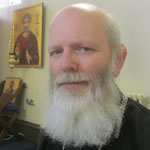In the name of the Father and the Son and the Holy Spirit. God is one. Amen. Christ is risen!
I begin by reading Acts 11:19-30, then John 4:5-42. If you’re like me, you might have noticed there’s an awful lot of strange folk there, strange certainly in the Jewish mind at that time. They would have regarded almost everybody in the story as sort of being rag-tag and bobtail, sort of people you really want to stay away from, because they’re a little bit frightening and out of the ordinary, foreigners and strange folk, Gentiles, non-Jews, people you would normally keep well away from. And that’s really interesting, because if you look again, you will notice that in both cases—in Acts and also in John—the apostles play it safe. They keep away from those Gentiles. They keep away from those Samaritans. They’re surprised when they hear that Gentiles are turning to Christ. They are really shocked when they discover that the Lord has been talking to a Samaritan woman.
Well, the men of Cyrene and Cyprus, they took the risk. They went to Antioch, and they started to speak about the resurrection, about the divinity of the Lord, the God-man, to the Gentiles in Antioch, and—hey, presto!—these people turned to the Lord and were being saved. The apostles back in Jerusalem found that difficult, so they sent Barnabas to go and find out what was going on.
The Lord also—he didn’t play it safe. While the disciples went off to get food, they were shocked to discover when they came back that he was talking to a woman, a Samaritan woman, a lone woman, a woman moreover who had had five husbands and was on her sixth. We call this lady Photini or Claire or Svetlana. All of these people were most unlikely for the Lord to be talking to in the disciples’ minds. Talked to a woman who had had—and was on her sixth—husbands. Talked to a woman. Talked to any Samaritan! All of these things would be shocking for them. They would not have taken that risk.
But the Lord, he took that risk. He thought it worthwhile to engage her in a long discussion. What it was about doesn’t matter for this moment; that’s for another sermon. But what were the results of these risks? Well, in Acts of the Apostles 11, we discover in Antioch that a large company of people was added to the Lord. When the Apostle Barnabas saw what was happening and approved and liked what he saw in Antioch, he went and got Saul, whom we also call Paul, and he and Paul ministered there, preaching the Gospel for an entire year. And a great group of people from Antioch were gathered together. In fact, that’s where we get our name of Christians from, from Antioch itself. A very interesting thing.
This rather rag-tag and bobtail that rather worried the apostles turned out to be the founder members of one of our patriarchates! Extraordinary! Wonderful! And their spiritual descendants continue to this day—probably also rag-tag and bobtail people! [Laughter] Like me!
And then the Samaritans in John: We end up discovering that the woman ran off back into her village, telling everybody, “You must come and see this guy! He’s told me everything I’ve ever done!” At the end of the story, they tell her, “We don’t need to hear you any more. We already know. We can see with our own eyes and hear with our own ears. This Man is the Lord, the Savior of the world.”
And then there were fringe benefits as well. For example, as a result of the preaching, the Antiochians sent to Jerusalem a great heap of money in the hands of Paul and Barnabas, to help them out when there was a famine in Jerusalem. And the disciples and Jesus were looked after by that Samaritan village for two whole days. Big! That’s a large proportion of his earthly ministry.
So what does this have to tell us? Well, I think several things. One of them is: you don’t need to be an official. You’ll notice that the officials didn’t actually do any of these things. The official apostles who were sent out to do all sorts of stuff didn’t missionize the village. It was missionized eventually by a woman who had seen the Lord with her own eyes and went off to tell all of her friends—she wasn’t even a Jew—what she had seen and whom she had met.
In Antioch, the officials were still in Jerusalem—they sent an official, Barnabas, but it was men from Cyprus and Cyrene who began a mission there. So you don’t have to be an official. You don’t have to have had somebody or other make you into something other than simply believing on the Lord. If you know Christ—you know him, you know what he has done for you, you know that he is the Son of God, you know that he is the God-man, you know that he has risen from the dead, you know that he will come to judge the living and the dead—and that in the end, well, that’s all you need to know to begin with. That is something that you can share with others, fellow rag-tag and bobtail. So that’s one thing.
Second thing is: you notice the enthusiasm of those people in Antioch. They cracked on with it, and by the time Barnabas had arrived, there was already quite a church there, and after a year, a great company of the Church, once Saul had arrived with Barnabas. Their enthusiasm for the Gospel spilled out over into giving as well in both cases. So people in the Samaritan village ministered directly to God, feeding him. In Antioch, they ministered directly to God by feeding the Church in Jerusalem. Huge enthusiasm for the Gospel and then for practicalities: getting on and doing things. They told each other, and then they acted upon it.
And another thing is that it’s the most unlikely people. I’ll go back to this English saying, “rag-tag and bobtail”—all sorts of unlikely folk. Others would have thought of them as dross. What do you want to go telling these Gentiles for? Eugh! Why do you want to talk to these nasty Samaritans? Eugh! Horrible!
And sometimes in our congregations we need to overcome some of these prejudices and realize that Christ came to save the rag-tag and bobtail—like me. Unlikely people turn to Christ. Unlikely people bring others to Christ. Unlikely people don’t play it safe. So be an unlikely person. [Laughter] Come to Christ. Be an unlikely person: tell others about our Lord. Be an unlikely person, and don’t play it safe.
The Lord be with you, your prayers. Christ is risen! Amen.

 Archimandrite Philip Hall
Archimandrite Philip Hall